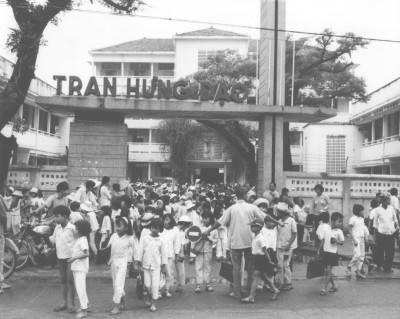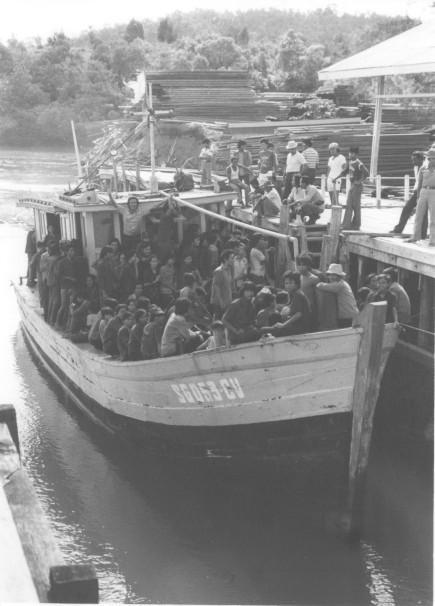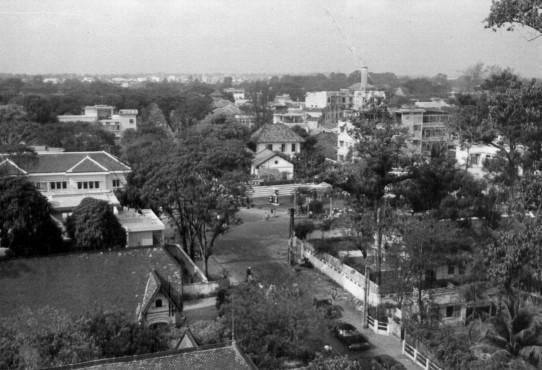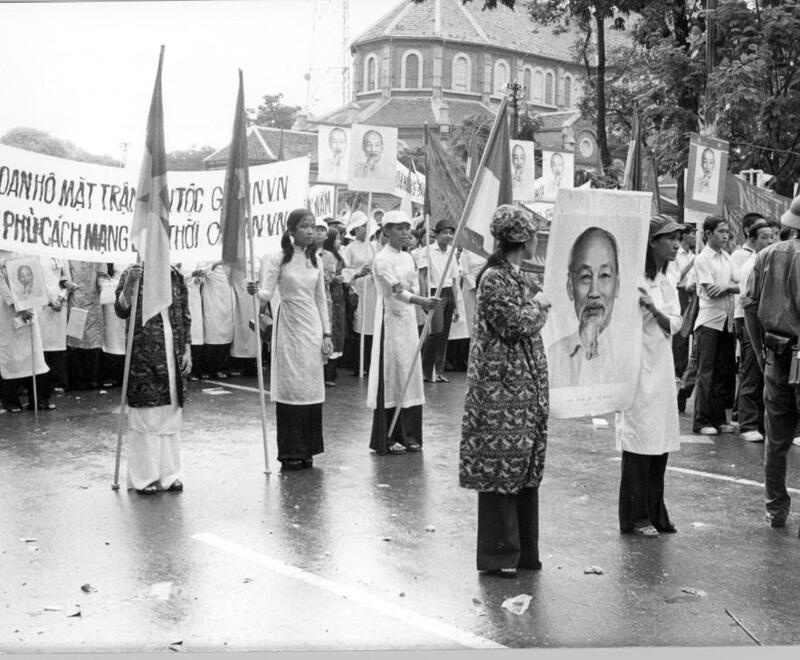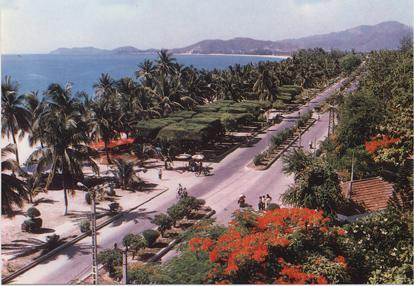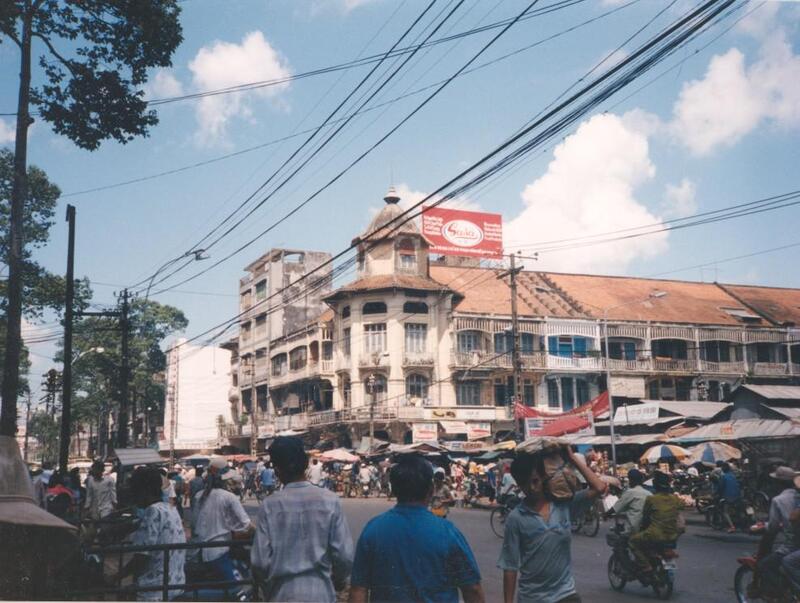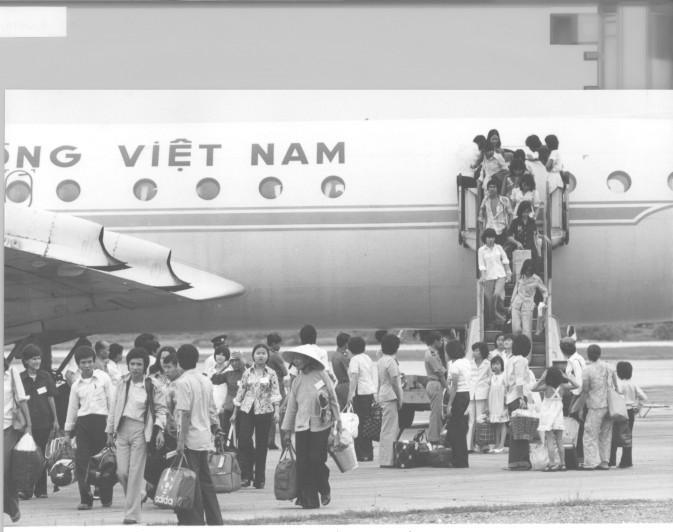Perspectives on Freedom: Vietnamese Refugees' Migration Narratives
On this page, we will analyze a series of oral history interview excerpts to evaluate Mimi Nguyen’s thesis that "the gift of freedom" is an empire making tool used to establish a relationship between the governed and the governor and manifests in a feeling of indebtedness. We will critique Nguyen's thesis by highlighting other understandings of freedom in our narrators' stories. By looking at the context of immigration and the hardships faced in the journey itself, we suggest that the subjectivity of each narrator affects the degree to which each narrator feels a sense of indebtedness and reproduces the "gift of freedom" narrative.
All of the following oral histories are reproduced here for educational purposes. I have included quoted excerpts from the transcripts to illustrate my argument. Please click on their titles to access the full oral history.
Oral History of Suzie Xuyen Dong Matsuda:
Suzie was born in 1965 in Saigon, Vietnam. Her mother was an orphan, whose parents were killed by a Japanese bomb, and her father left her mother when Suzie was born. Suzie’s mother raised Suzie and her half-brother as a single mother. Suzie’s mother married an RVN soldier, who was away for her entire childhood fighting the war. After North Vietnam reunified the country in 1975, her family was persecuted for her step-father’s service in the Republic of Vietnam’s army. Suzie’s family tried to escape multiple times, but her brother was caught and sent to a prison reform camp. Suzie escaped in 1983 as a “boat person” and landed in Indonesia, where she lived in a refugee camp. Suzie eventually came to the US, graduated from Chapman University, and became a clinical psychologist.
Since Suzie was born and raised in Saigon, she received her entire childhood education in Vietnam. In the following quote, she reflects on her education and describes its limitations:
“I did what they asked me to do, all kind of community volunteer work and stuff but really it did put a shield for me to have this critical consciousness of what, where I was, I was very brainwash. I didn’t have that critical conscious until I come here and then met with friends and know about the prize of freedom and freedom of speech and freedom for fear and all of that. I didn’t, you know when the fish is in the water it doesn’t know it’s wet until it gets out from the water, right? So that’s what happen to me. I was pretty much brainwash, until I come here.”
Suzie’s statement “I was pretty much brainwash” and her metaphor about “when the fish is in the water it doesn’t know it’s wet until it gets out from the water” suggest that the main difference between Vietnam and the US is the ability to think freely. In Vietnam, Suzie was unable to develop a "critical consciousness" because of the schooling and communist "brainwash." These statements suggest that Suzie conceptualizes freedom as a mental state of being, specifically the ability to think critically. Her statement supports Nguyen’s argument that the American gift of freedom claims all types of freedom as its own consequence because Suzie’s freedom is the ability to develop a critical consciousness.
Suzie fled Vietnam without her family by boat. The boat first landed in Indonesia, where she lived in a refugee camp. At this camp, she experienced sexual assault and verbal and emotional abuse while simultaneously feeling isolated and alone. In the following quote, Suzie discusses the impact of this traumatic experience:
“Coming here to this country without family, I always have to do everything I could to be accepted by other people. There’s nothing all unconditional, but you know I very grateful for the people that took me in and I am grateful for the people who have helped me along the way and that’s why I become the volunteer after 2 years, I come to this country, I become volunteer. I want to give back. Definitely, the dramatic experience that I had the emotional abuse the verbal abuse and sexual abuse is the reason why I am in the field of psychology, clinical social work and get a doctorate in clinical psych, because it help heal me first."
Suzie’s statement “I very grateful for the people that took me in and I am grateful for the people who have helped me along the way and that’s why I become the volunteer after 2 years, I come to this country, I become volunteer. I want to give back” demonstrates Nguyen’s thesis of indebtedness for opportunities presented in the US. However, Suzie’s next sentence “the dramatic experience that I had the emotional abuse the verbal abuse and sexual abuse is the reason why I am in the field of psychology, clinical social work and get a doctorate in clinical psych, because it help heal me first” suggests that this sense of indebtedness comes from Suzie’s own personal experience of assault.
Nguyen’s “gift of freedom” thesis argues that Vietnamese refugees feel a deep sense of indebtedness because they believe the US has gifted rights and opportunities unavailable in Vietnam. Suzie’s statement indicates that her sense of indebtedness comes from personal experience, specifically assault. In Suzie’s experience as a “boat person,” she experienced sexual assault and was completely isolated and removed from her family and former support network. Suzie suggests that her thankfulness stems from the relative safety she experienced in the US, where she is no longer a “boat person” and is freed from the unsafe refugee camp.
Nguyen’s “gift of freedom” thesis abstracts the personal trauma and history of refugees, thus failing to recognize how the subjectivity of each narrator develops the sense of thankfulness refugees experience. Suzie does feel indebted to the US, as evident in her decision to give back, but Suzie implies that she is not simply grateful for freedom but also for the physical safety and welcoming that she did not receive as a refugee. Suzie’s story suggests that Nguyen’s thesis does not acknowledge the personal history and trauma that produce a sense of indebtedness.
Oral History of Jennifer Yen Pham and Duy “David” Do:
Jennifer and David are a married couple now living in Orange County, California. They were both born in Saigon, Vietnam in 1964 and 1959 respectively. Jennifer’s family was Catholic and left North Vietnam for Saigon in 1954 to flee the communist North. Though Jennifer was Vietnamese, her parents acquired a Chinese identity for Jennifer, which she used to leave Vietnam through through the Orderly Departure Act in 1979. David’s family escaped by boat in 1978. David and Jennifer met in 1983 at school in Cal State Fullerton and married in 1990.
Jennifer and David's oral history interview was given together. Throughout the interview, we can find many instances of the "gift of freedom" narrative and the sense of indebtedness. For instance, in the following quote, David reflects on how he feels lucky to have escaped to the US:
“We nobody! We’re just hard workers, we earned a living in this freedom country you know. So I’m glad this country give us a chance, you know to leave and grow in here and many generation after us, you know.”
David’s above quote illustrates Mimi Nguyen’s “gift of freedom” argument and a sense of thankfulness. David characterizes the US as “this freedom country,” immediately casting the US as free and implying Vietnam was not free. He states that he is “glad this country give us a chance, you know, to leave and grow in here and many generation after us,” fitting the “gift of freedom” thesis that refugees are thankful for the US gifting opportunity and freedom to refugees. David builds upon this sentiment when he states the following in response to Jennifer's statement that she considers herself Vietnamese American:
“And I hope that we can contribute you know a lot for this but then rich, freedom country because I live in the United States that children so many race, so many people all over the world and the communist through the years. We got a great country, so I hope our community very strong”
In the statement above, David expresses American exceptionalism and refugee indebtedness, explaining his “hope that we can contribute you know a lot for this but then rich, freedom country.” He invokes the “gift of freedom” dichotomy between the free US and the not free communists, stating that “we got a great country” while others must live with “the communist through the years.” In the same interview, Jennifer states the following:
“So that’s why I’m very mad at those people that they came here and they talk bad about this country, you know? They are immigrants, they came here by choice, and you know why talk bad about this country. A lot of like… I’m not naming any ethnic group. I’m mad at… I got to name somebody… like those Middle Eastern people, they came here and they… you know we attacked on 9/11. And a lot of people say, ‘Oh U.S. people is this and U.S. people that’ and they live in this country, they talk bad about our government about our country. Why you came here for? Why don’t you go back to your own country where there is war and people killing each other every. Where women can’t open their face, they have to cover their face you know. Where you have no right to vote, where you have no right to have a job, where you have no right to go to school, and why you came in here and have all those right and all those freedom and you still talk bad about us, about this country? I’m mad at those people… That’s what I say to some people, they take life for granted.”
Jennifer’s statement suggests that immigrants and refugees have no right to criticize the US because the US, unlike other countries, has provided the gift of freedom. Jennifer’s proclamation that immigrants “came here by choice” and her anger for their lack of thankfulness reflect Phuong Tran Nguyen’s argument in Becoming Refugee American that instead of assimilating into being Asian American, refugees created a new identity called “Refugee American,” intimately tied to refugee nationalism. Refugee nationalism describes a nationalistic devotion to refugees’ host countries and, for Vietnamese refugees, the former Republic of Vietnam. For Vietnamese refugees, refugee nationalism manifests as indebtedness to the American state as their savior and hyper-anticommunism in order to condemn the current communist state of Vietnam and to pledge devotion to the former Republic of Vietnam.
Jennifer's statement reproduces the refugee nationalism mindset that the US is far superior to immigrants’ home countries. Jennifer directs her anger towards Middle Eastern immigrants and not fellow Vietnamese refugees or Asian immigrants, reproducing American racism against Middle Easterners. Though Jennifer is from Vietnam, she expresses many American patriotic tropes, including the criminalization of Middle Easterners, beliefs that the Middle East is inherently less free and inferior to the US, and American exceptionalism. Her views align with refugee nationalism, part of which includes devout patriotism to the refugee's host country. Phuong Nguyen specifically examined Vietnamese refugees in Orange County, CA, which is where Jennifer and David both reside. Thus, it is unsurprising that Jennifer and David match her description of “Refugee Americans.”
As Phuong Nguyen writes, “refugee nationalism represented an attractive mode of becoming American for those who had little power. The ability of working-class people with limited English skills to extract concessions from a guilt-ridden public proved effective enough that campaigns for rights seemed necessary in the face of appeals to sympathy.” Phuong Nguyen’s argument suggests that refugees used the American savior complex and American guilt to better their status. Refugee hyper-anticommunism coincided with a full embrace of American ideals. The refugee nationalism mindset explains Jennifer’s anger at immigrants’ lack of thankfulness and suggests that Vietnamese immigrants used the racial hierarchy created by the “gift of freedom” to better their status as a minority.
Oral history of Chanh Minh Nguyen:
Chanh Minh Nguyen was born in 1969 in South Vietnam. Chanh was born into a wealthy family. His grandfather was a high school principal and university professor. After the reunification of Vietnam, Chanh’s grandfather was imprisoned as a political prisoner and the communists confiscated their family’s belongings and wealth. Starting with the fall of Saigon in 1975, Chanh’s family became extremely poor. Chanh escaped Vietnam in 1980 by boat and landed in Malaysia, where he lived for a year before coming to the US. Chanh received his bachelor’s degree in Criminal Justice at Cal State Long Beach in 1991 and became an investigator and, later, a real estate agent. He now lives in Westminster, CA, with two children.
After describing his escape from Vietnam by boat, Chanh stated the following:
“And I cannot begin to tell you how fortunate I was-- I am- to be here, to have the freedom, to have the everything that we have at this time. I'm very thankful for what we have and I think others should be thankful for everything that they have here in America. For those who were born here, they are one of the luckiest species on Earth- you know, to be born in America. This is pretty much-- of course this is not utopia, a perfect society. It's not a perfect society, but it's the greatest on Earth. People here have plenty of food to eat, you have plenty of choices, we can raise our opinion at any time we want- we have so much freedom on many things. And we should value what we have and by doing so, we should realize that there are many other people around the world that are very unfortunate people.”
Like Suzie, Jennifer, and David, Chanh reproduces the “gift of freedom” narrative and posits the US as “the greatest on Earth [because] people here have plenty of food to eat, you have plenty of choices, we can raise our opinion at any time we want—we have so much freedom on many things.” This quote evidences that Chanh believes the “gift of freedom” and its associated qualities make the US superior to other countries because “there are many other people around the world that are very unfortunate people.” Chanh exemplifies the thankfulness Mimi Nguyen describes in his statement “I’m very thankful for what we have.” Chanh’s statement “and I think others should be thankful for everything that they have here in America” echoes Jennifer’s anger that other immigrants criticize the US and seem to lack gratitude.
The juxtaposition between Chanh’s above statement following his harrowing story of escape by boat suggests that this thankfulness directly stems from the hardships faced in Vietnam and the refugee journey itself. As described in the brief summary of Chanh’s interview, Chanh’s family lost their wealth, position, and belongings when the Communists reunified Vietnam. Chanh’s grandfather was placed in a political prisoner camp and their family was forced into poverty. Given these circumstances, it is unsurprising Chanh feels that people who are born in America “are one of the luckiest species on Earth” because in the US, Chanh no longer feared communist persecution and felt like he had been granted freedoms. Chanh’s narrative suggests that Mimi Nguyen’s thesis about the “gift of freedom” and refugee indebtedness ignores the circumstances that cause refugees to immigrate, which create the profound sense of thankfulness in refugee narratives.
Nguyen’s “gift of freedom” thesis focuses on refugees’ experiences in the US, specifically the opportunities and rights available in the US that do not exist in Vietnam. However, Chanh’s story suggests that his thankfulness for the US partly stems from the change in Vietnamese society, specifically his family’s loss of status and wealth that put them into destitution. Chanh reproduces the “gift of freedom” narrative and refugee indebtedness, but Nguyen’s thesis does not adequately recognize how refugees’ personal experiences and histories produce their sense of thankfulness. The “gift of freedom” establishes a hierarchy, placing the US as “the greatest on Earth,” but refugee reproduction of this rhetoric partly originates in personal experience.
Oral History of Stephen Le:
Stephen's interview also contains many instances of American exceptionalism, but though he speaks about the traits and opportunities Mimi Nguyen presents in the "gift of freedom" argument, he lacks the sense of indebtedness and thankfulness expected of refugees.
“A lot of US, they good for kids sleep here and freedom speaking, and if you work hard and you still have, money, what do you want to buy? You know, that's, you know, I think it's, uh, yeah, in Vietnam is different. They, the people, they live for a little bit different, like American … Like in Vietnam, people, if they working hard, they don't have much money too because the people only $300 a month average. You know, some people earn more like, you know, and average people working, you know, like, yeah, I am in this. If you live in America, if you working hard, and you, you buy what you want.”
As evident in Stephen's above quote, his definition of freedom is the ability to speak freely and save and earn money. The statement “in Vietnam, people, if they working hard, they don’t have much money too because the people only $300 a month average… If you live in America, if you working hard, and you, you buy what you want” indicates that Stephen considers one of the main differences between Vietnam and the US to be the ability to earn money through hard work. The comparison of opportunity available and possible wages in Vietnam and the US supports Nguyen’s thesis that the gift of freedom claims the opportunity to prosper. Stephen expands on his definition of freedom in the following quote:
“I think we happy to leave in Vietnam. You know, we're not, you know, that they not freedom. No, they’re not freedom speaking. They say yeah, and they don't, you know… You say something. And every time I go back to Vietnam, I don't say nothing for the government. Better not because they don’t like it, you know, we're not involved in, you know how to, for that. That’s why, I think, that’s why we like America better.”
Stephen’s above quote indicates that he likes the US because of the ability to speak freely. In Vietnam, “I don’t say nothing for the government” out of fear of punishment. His statement “they not freedom” indicates that to Stephen, freedom is based in the ability to speak without repercussions for diverse thought.
Although Stephen’s interview never explicitly mentions any sense of thankfulness or indebtedness to the US, his interview reproduces Nguyen’s argument that refugees understand the US as a place of opportunity unavailable in their home country. Stephen’s quotes support Nguyen’s argument that "the gift claims as its consequence... the right to have rights, the choice of life direction, the improvement of body and mind, the opportunity to prosper [all] against a spectral future of their nonexistence, under communism, under terror." Stephen’s apparent lack of indebtedness suggests that not all refugees consider the gift of freedom as an object of exchange. Instead, Stephen seems to consider freedom as simply an opportunity.
Though a more careful analysis of Nguyen’s work is needed, perhaps Stephen counters her thesis on indebtedness because Stephen immigrated to the US in very different circumstances than the “typical” refugee. As Phuong Tran Nguyen writes, “forced migration defined most refugee departures” and refugees are defined as “people who must live outside their country because of a profound fear of persecution based on ethnicity, race, religion, or politics.” Stephen’s recounting of the immigration process describes paperwork and implies an easy, simple move. Stephen immigrated to the US through the Amerasian Homecoming Act, which was designed to protect his Amerasian sister. Stephen does not mention persecution in his interview, so perhaps he lacks a sense of indebtedness because he did not immigrate out of fear. Since the Amerasian Homecoming Act portrayed Amerasians and their families as refugees, Stephen’s apparent lack of indebtedness suggests that a more nuanced understanding of “refugee” may counter the “gift of freedom” thesis.
Stephen’s lack of indebtedness may actually critique the American understanding of Amerasians. As discussed on the prior page, American media focused on abandoned, orphaned Amerasian beggars like Le Van Minh. However, Stephen’s family did not abandon their Amerasian sister and his entire family was raised by their single mother in Nha Trang. Stephen’s family’s narrative does not fit the American understandings of Amerasian experiences. Stephen’s family immigrated to the US under the Amerasian Homecoming Act as refugees, but perhaps Stephen does not reproduce the “gift of freedom” thankfulness because he and his family do not fit the typical refugee trope. Stephen’s lack of thankfulness exposes the American dramatization of Amerasian experiences and that a more nuanced understanding of “reguee” is needed.
Oral History of Mary Hong:
Mary Hong is Stephen Le’s wife and immigrated to the US from Saigon, Vietnam in the early 2010s. Unlike the other oral history narrators included, Mary is not a refugee and immigrated through her marriage to Stephen. Mary was born in 1988 and she remembers little direct impact of the Vietnam War on her childhood. As such, her experience is even more remote from the refugee experience. Nevertheless, in the quote below, she reproduces American exceptionalism.
“Yeah, but in U.S. have a lot of people have when you have a lot of kids, and a lot of people will help you. But in Vietnam, you have to do everything by yourself with a seven kids … go to school, then … and meal and everything. Very hard… I just heard from my husband in U.S. when for the poor people or the people have a kids but cannot, because when you, for a single mom … when they have a kids and they cannot go to work for the full-time, they cannot find for the good job they cannot get for a good salary, not enough. And the … the woman will help them at least for the food something [Transcriber’s note: referring to the Supplemental Nutrition Assistance Program, previously known as “food stamps”] and in Vietnam don't have that… And I have a couple of people when they brought a baby and they cannot go to work something and they will send for her for the mail for the food for the kids. Just for the baby, but that's very nice. In Vietnam don’t have that.”
Though Mary does not mention any sense of thankfulness or indebtedness, her quote suggests that if she did feel so, this thankfulness would stem from American programs Vietnam does not provide. Mary appears to like the US and espouses American exceptionalism for American opportunity and supportive programs. Both Mary and her husband, Stephen, reproduce American exceptionalism with regards to the opportunity present in the US, but unlike Stephen, Mary does so from a mother’s perspective. Stephen highlighted the ability to earn money while Mary focuses on the maternal leave and maternal support available in the US. The difference in Stephen and Mary’s reason for US exceptionalism suggests that immigrants see American exceptionalism in many facets of life, helping explain why American exceptionalism narratives are so pervasive.
Although Mary does not mention freedom or the “gift of freedom,” her statement relates to Nguyen’s thesis that the US gift of freedom claims all qualities like opportunity and support programs as unique to the US. Like Stephen’s interview, Mary’s interview suggests that the “gift of freedom” mindset may be unique to refugees who were fleeing active persecution. As an immigrant who did not face bodily persecution, it appears that Mary simply came to the US for her marriage and for opportunity, perhaps explaining the lack of indebtedness.
Nevertheless, Mary reproduces American exceptionalism, suggesting that the “gift of freedom” thesis may be unique to refugees but the American exceptionalism narrative is not. Mary does not feel thankful likely because she does not feel like she has been rescued by the US. Nevertheless, she has internalized American exceptionalism and values the US for what Vietnam lacks. The freedoms Mary discusses are opportunities unavailable in Vietnam, suggesting that Mary sees American exceptionalism and American freedom through an understanding of opportunity.
The author presented here was born in 1962. She and her family fled Saigon in a US helicopter the day of the Fall of Saigon, April 30, 1975. The author’s mother worked for the US Air Force for twelve years. Her family was Buddhist and had left North Vietnam in 1954 after the signing of the Geneva Accords, which provided safe passage from the North to the South. Her grandfather was a mandarin (government official). She wrote this essay as a freshman in college in 1980.
“In 1975, I felt thankful to Americans for helping my family get out of Vietnam and start a new life. But I cannot appreciate America fully because this atonement is not enough compared with all the suffering that Americans had caused the Vietnamese who now live under Communism. My image of America as a superior, benevolent, and grandiose nation has disappeared… Though some Americans are indeed benevolent, many think of themselves first and do not care about other people. Americans may be grandiose in terms of their physical appearance, but often their minds are selfish and immature. However, I have met many nice Americans who impressed me with their kindness and openness. As I juggled these different images, I began to realize that American society contains a great variety of people with many different perspectives on life. Not only that, but there are many races and nationalities in the United States.”
The above quote suggests that Mimi Nguyen’s argument—that Vietnamese refugees experience profound thankfulness for the “gift of freedom” and, thus, maintain a racial, colonial hierarchy—essentializes the refugee’s understanding of the US. The writer is thankful for American assistance in escaping, but the writer also states, “I cannot appreciate America fully because this atonement is not enough compared with all the suffering that Americans had caused the Vietnamese who now live under Communism.” This statement counters Nguyen’s argument about refugees feeling indebted to the US and instead attests to the complicated feelings a refugee experiences for the US, which simultaneously abandoned her people and claimed to be their savior. The writer is careful to not essentialize Americans, both recognizing that she has been treated well by some Americans but also critiquing American culture and representations of their benevolence. The author’s statement “often [American] minds are selfish and immature” counters Phuong Tran Nguyen’s “Refugee American” hyper-nationalistic mindset. This writer’s quote suggests that Mimi Nguyen’s “gift of freedom” thesis does not acknowledge the complicated relationship between Vietnamese refugees and the US as their new host country which abandoned them to the Communists, causing the predicament that spurred their flight.
Although Mimi Nguyen’s “gift of freedom” thesis is not perfectly represented in each narrator’s interview, the “gift of freedom” framework remains a useful way to critically examine refugee and American narratives. The “gift of freedom” analysis demonstrates that American exceptionalism is actively produced and maintained in both the governor—the United States claiming to benevolently extend freedom to its inferiors—and the governed—refugees who thank the United States for its benevolence. Contextualizing each oral history narrator’s interview suggests that the "gift of freedom" thesis essentializes the many nuances behind narrators’ attitudes. The motivations are not simply thankfulness for rights but can also stem from personal abuse, as seen in Suzie’s narrative. The definition of “refugee” is too broad to simply say that all refugees reproduce the “gift of freedom” thankfulness, as seen in the apparent lack of thankfulness in Stephen and Mary’s interviews. Furthermore, even those who do fit the official definition of refugees may have a nuanced understanding of freedom and their relationship to the US, as seen in the chapter "Integrity through Change." Though we have only used six firsthand accounts here, this brief glimpse into refugee narratives suggests that interpreting refugee narratives requires careful attention to each narrator's subjectivity, which affects how narrators define freedom and interact with the hierarchical system they are placed into as refugees.
Combining Phuong Tran Nguyen’s understanding of “Refugee American” and Mimi Nguyen’s “gift of freedom” framework suggests that the indebtedness for the “gift of freedom” is most apparent in refugees who have embraced the refugee American identity to assert their position in American society. By taking advantage of American guilt, these refugees could avoid racism directed at immigrants. This same indebtedness positions refugees as beholden to their American savior but simultaneously allows refugees to find their place in the US. We must be critical of “the gift of freedom” as a colonial tool that enables the US to wage wars and create a social hierarchy, but we also must recognize that the reproduction of “the gift of freedom” narrative in refugees is more complex than simply empire making. Each refugee’s personal history shapes their relationship with their new host country, helping explain the differences in each refugee’s narrative quoted on this page.
